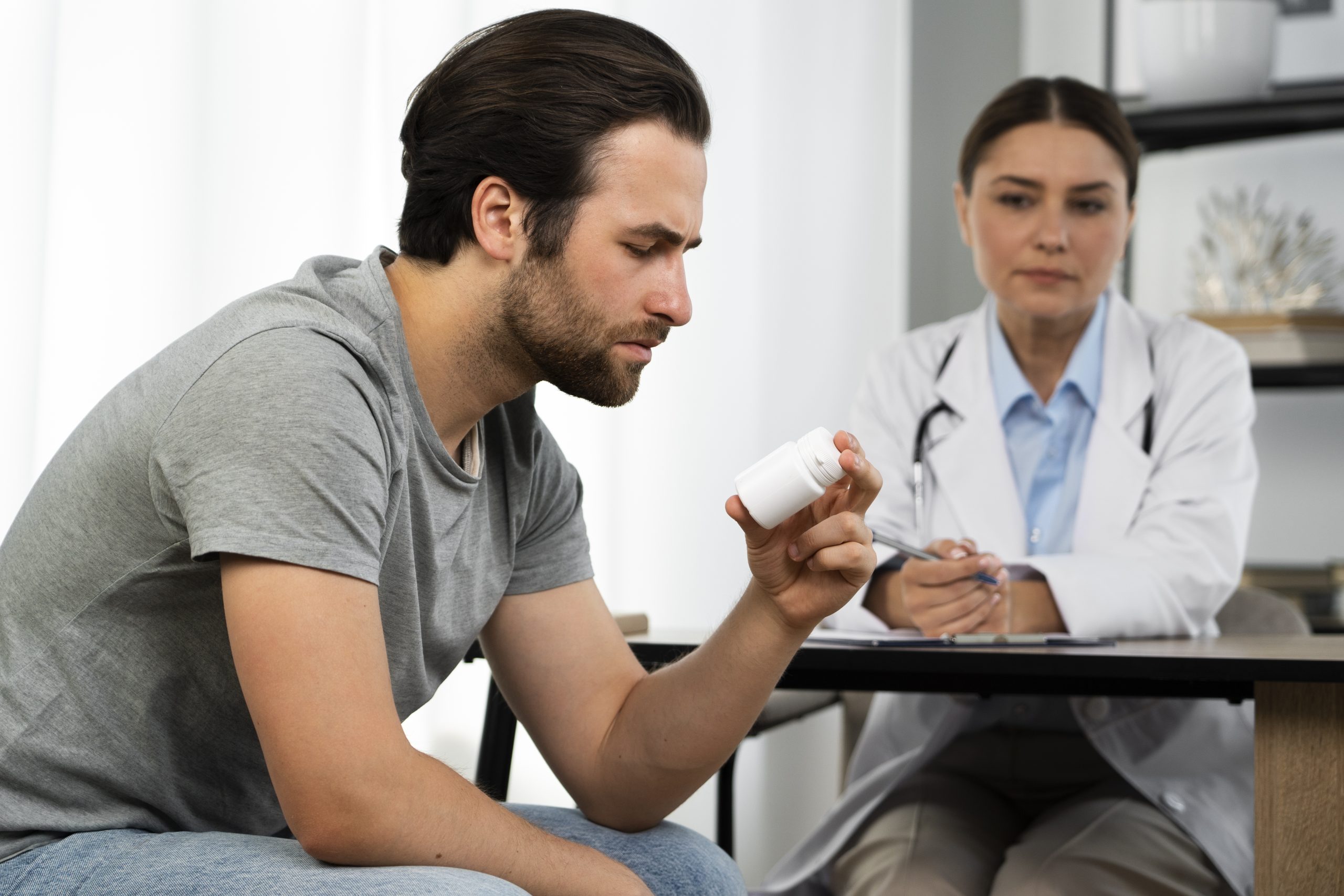People with substance use disorder often struggle to get the help they need. However, when seeking out professional help for their addiction, many people may learn that they have a co-occurring mental health issue. This can make it more difficult and complex to address the underlying causes of drug abuse and develop a comprehensive and effective dual diagnosis treatment.
But if you’re unfamiliar with dual diagnoses, you probably have a lot of questions. For example, what does dual diagnosis mean? How does treatment for dual diagnosis work? What are the signs and symptoms of dual diagnosis? Finally, where can you get treatment for dual diagnosis at an inpatient residential rehab?
In today’s guide, we will answer all of these questions and more, but first, let’s look at the definition of “dual diagnosis.”
Table of Contents
- What Is Dual Diagnosis?
- Dual Diagnoses & Substance Abuse
- Most Common Dual Diagnosis
- Depression & Substance Abuse
- Anxiety Disorder & Substance Abuse
- Bipolar Disorder & Substance Abuse
- Post-Traumatic Stress Disorder (PTSD) & Substance Abuse
- Schizophrenia & Substance Abuse
- Signs That A Loved One Needs a Dual Diagnosis Treatment Center
- How To Get Proper Dual Diagnosis Treatment
What Is Dual Diagnosis?
Dual diagnosis, sometimes known as “co-occurring disorders,” refers to a mental health disorder that is also accompanied by a substance use disorder. For instance, a person suffering from anxiety may develop an addiction to Valium, while a person struggling with an addiction to heroin may develop depression as a direct result of substance abuse. Since both disorders can influence and exacerbate one another, dual diagnosis can be harder to identify and treat than a substance use disorder or mental health disorder on its own.
Dual Diagnoses & Substance Abuse
If you or a loved one is struggling with a dual diagnosis, it is vital that you don’t prioritize one disorder over the other. Instead, you should seek out treatment for both disorders simultaneously. Comprehensive dual-diagnosis treatment may involve a wide range of therapies and approaches, including medication, behavioral therapy, support groups, and rehabilitation. Treating both conditions at the same time makes it far more likely that you’ll see positive results for your mental health and overcome your addiction.
Dual diagnosis is far more common than many people realize, primarily because people with existing mental health disorders often use drugs or alcohol to try to cope with the condition or alleviate symptoms. As previously mentioned, the reverse may be true, as people who are addicted to drugs or alcohol may develop mental health disorders like anxiety, depression, or schizophrenia as well.
Most Common Dual Diagnosis
While there are nearly 300 unique mental disorders listed in the DSM-5, not all of them are commonly linked with substance abuse. Here are some of the most common dual diagnoses we encounter:
Depression & Substance Abuse
Depression is one of the most common mental health disorders in existence. It is characterized by persistent feelings of sadness, hopelessness, and low energy (among other symptoms). While not everyone who abuses drugs will develop depression and not everyone with depression will develop a substance use disorder, the two can have a significant impact on one another. Drugs and alcohol are some of the most common coping mechanisms among individuals with major depressive disorder. Sadly, while substance abuse may offer temporary relief from certain symptoms of depression, it often makes the symptoms even worse over the long term.
Anxiety Disorder & Substance Abuse
Anxiety disorder encompasses a wide range of conditions that are generally characterized by worrying, restlessness, and fear. Here are some of the most common anxiety disorders:
- Generalized Anxiety Disorder (GAD)
- Panic Disorder
- Social Anxiety Disorder
- Obsessive-Compulsive Disorder (OCD)
Any of these conditions can be the cause or the result of substance abuse. As previously mentioned, it is easy for someone with an anxiety disorder to become addicted to prescription medications like Valium, Xanax, or Ativan. However, someone with an anxiety disorder may also turn to alcohol or even street drugs as a way to self-medicate. Not only does substance abuse create a cycle of dependency, but it often worsens anxiety.
Bipolar Disorder & Substance Abuse
Bipolar disorder is most often characterized by extreme mood swings or periods of emotional highs (known as mania or hypomania) and lows (depression), sometimes interspersed with mixed mood states that involve symptoms of both. There are various types of bipolar disorder, which can fall somewhere on a spectrum between the following primary diagnoses:
- Bipolar I – Individuals with Bipolar I have had at least one manic episode, with or without the presence of a depressive episode.
- Bipolar II – Individuals with Bipolar II have had at least one depressive episode and at least one manic or hypomanic episode.
- Cyclothymic Disorder (Cyclothymia) – Cyclothymia is a milder form of bipolar disorder that is characterized by multiple periods of hypomanic and depressive episodes.
Substance abuse is frequently linked with bipolar disorder, as it can be a way to cope with both manic and depressive episodes. Unfortunately, substance abuse often has a destabilizing effect on mood and mood disorders, which only hinders the recovery process.
Post-Traumatic Stress Disorder (PTSD) & Substance Abuse
As the name implies, post-traumatic stress disorder (PTSD) is a condition brought on by a traumatic event in a person’s life. Some of the most common symptoms include intrusive thoughts, avoidance of triggering situations, feelings of fear, shame, guilt, or anger, difficulty concentrating, and disruptions in sleep.
Post-traumatic stress disorder (PTSD) is a mental health condition that can develop after a person experiences or witnesses a traumatic event, such as a natural disaster, serious accident, terrorist act, war/combat, sexual assault, or any life-threatening or extremely distressing situation. PTSD can cause significant distress and impact an individual’s daily functioning, relationships, and overall well-being.
People experiencing PTSD often turn to drugs or alcohol to try to escape their traumatic past or subdue intense emotions. But just like other mental disorders, substance abuse only makes the symptoms of the underlying condition worse. Unlike other mental health disorders, PTSD is almost always the underlying cause of substance abuse. However, if a person experiences a traumatic event while abusing drugs, like violence or an overdose, they could develop PTSD as a direct result of their substance use disorder.
Schizophrenia & Substance Abuse
Schizophrenia is a chronic mental health disorder that distorts thoughts, behaviors, and perceptions of reality. It may cause a wide range of symptoms, including hallucinations, delusions, blunted emotions, and difficulty concentrating. There are drugs, like amphetamines or cocaine, that can increase the risk of schizophrenia. However, substance abuse often develops as a way to cope with the condition, even though it can complicate proper treatment.
Signs That A Loved One Needs a Dual Diagnosis Treatment Center
The only way to know for sure if someone you love needs dual diagnosis treatment is to seek out professional help. However, there may be signs that can indicate the presence of substance abuse and a co-occurring mental health disorder, such as:
- Drastic mood swings
- Social isolation or withdrawal
- Poor personal hygiene
- Secretive behavior
- Unexplained financial problems
- Sudden weight loss
- Changes in sleep patterns
- Poor performance at school or work
- Frequent signs of intoxication
- A history of substance abuse
How To Get Proper Dual Diagnosis Treatment
If you suspect that dual diagnosis is a concern, it is essential to seek help from professionals who are experienced in dealing with co-occurring disorders. Make sure that you find a treatment program that specializes in both mental health and substance abuse disorders. If you’re currently looking for such a program, Wellbrook Recovery is the answer.
Located in Brookfield, Wisconsin, Wellbrook Recovery is an inpatient residential rehab clinic that can provide individualized care for your dual diagnosis. From withdrawal management to group therapy, Wellbrook has everything you need to achieve lasting sobriety and treat your underlying conditions. If you or a loved one is suffering from substance abuse and a co-occurring condition, reach out to Wellbrook Recovery today.















